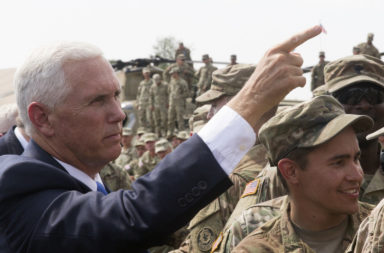The United States will send an aid package to the Israeli military worth $38 billion over the next 10 years. It is the largest in US history.
The previous agreement is going to expire in 2018 and totaled to $3.1 billion per year.
The new military aid package, known as the ‘memorandum of understanding’ (MOU), comes on the heels of 10 months’ worth of talks.
Pro-Palestinian groups criticized the deal, saying it encourages Israel to continue the construction of illegal settlements in the West Bank.
An pro-Israel lobby group, the American Israel Public Affairs Committee, claimed that the package would serve as a message of deterrence to the Jewish state’s enemies.
Last month the White House sternly criticized Israel for the continued building and retroactive approvals of illegal settlements. The settlements are a “serious and growing threat to the viability of a two-state solution,” according to the US State Department.
Israeli Prime Minister Benjamin Netanyahu recently equated the lawful removal of illegal Jewish settlements in the West Bank to ethnic cleansing. The international community rebuked this claim while Donald Trump’s US-Israeli relations adviser David Friedman released a statement expressing his support.
Palestinian leaders demand a Palestinian state with one precondition: No Jews. There’s a phrase for that. https://t.co/u5gfSW1thW
— Benjamin Netanyahu (@netanyahu) September 9, 2016
Israel has agreed not to lobby the US Congress for more funds for the length of the pact which ends in 2028. They have reportedly agreed to eventually only use the money to buy products from the US defense industry, instead of its own. The Israeli military will no longer be allowed to use the funds for its fuel as well.
The deal was stalled because of a clash between the Obama administration and Senator Lindsey Graham, the chairman of the Senate appropriations subcommittee that oversees the foreign affairs budget. Graham marked up another bill that would have given Israel $3.4 billion next year, instead of the usual $3.1 billion. Israeli government told reporters that the Obama administration would not sign the MOU if Senator Graham did not change his mark up back to $3.1 billion. Senator Graham reportedly told the administration “to go f*** themselves.”
Senator Graham also said that the MOU should be a minimum amount of funds, not the maximum. He objected to the Executive Branch’s involvement in appropriations and budgeting. Senator Graham said, “it’s very inappropriate for any foreign leader to lobby Congress [to keep appropriations lower].” He repeats, “I’m not going to be told what to appropriate.”
Israeli Prime Minister Benjamin Netanyahu was originally planning to wait for President Obama’s successor, but The Intercept reports that Netanyahu grew nervous about the possibility of an “’unpredictable’ Donald Trump.” According to Zalman Shoval, Netanyahu’s former ambassador to the US, this is true – “It is risky for Israel to let the existing agreement run out without knowing the drift of the future administration.” The official spokesman, David Keyes, declined all comment.
Netanyahu will find out if his rush to sign a deal was wise in 54 days.




